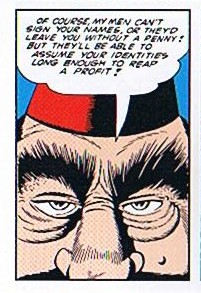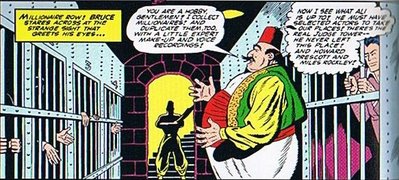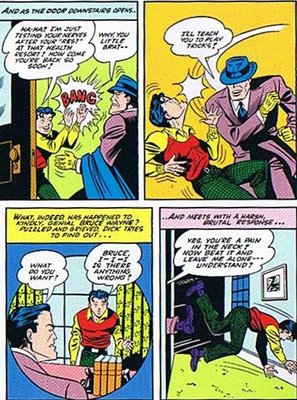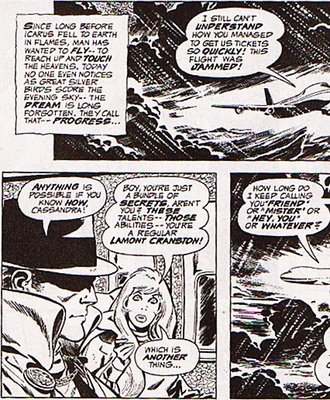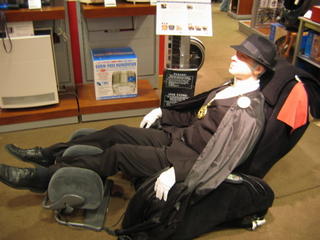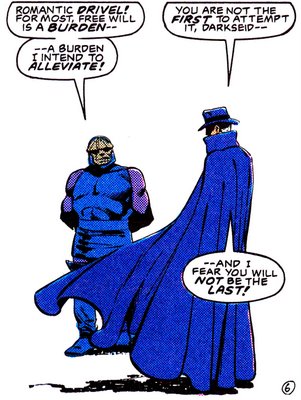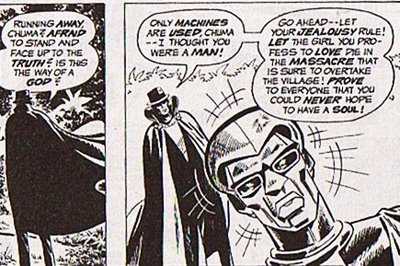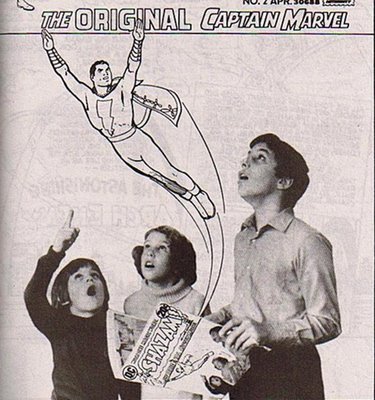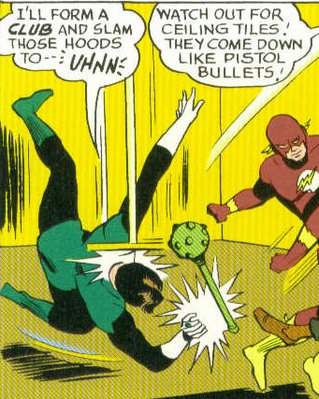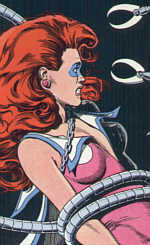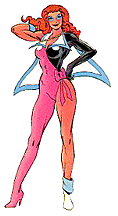As a result of buying the
Phantom Stranger Showcase, I've been posting a lot about PS here lately. How could I not? He's mysterilicious.
Devon suggested to me that I apply the Absorbascon's patented "Dynastic Centerpiece" model to Phantom Stranger; and so I shall!
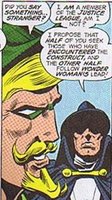 Dynastic Centerpiece: The Phantom Stranger
Dynastic Centerpiece: The Phantom StrangerAlthough there are lots of mystic DC characters, I don't think any of them really have a dynasty built around them. Oh, there are hints of it: Blue Devil and Zatanna each have "kid sidekicks" or "junior counterparts" in Kid Devil and Zatara. But there aren't any full-blown dynasties, and maybe that's part of what's kept such mystic characters on the periphery.
You'd think that one of the mystics who hangs out with superheroes regularly, like a Dr. Fate, would be the best bet for building such a dynasty. I submit the irony that the Phantom Stranger -- one of comics' pre-eminent loners -- comes the closest to becoming a Dynastic Centerpiece. After all, he
is a member of Justice League... .
Junior Counterpart: the Ghost of VibeJust kidding! Still, how fabulous would it be to have a ghostly breakdancing Puerto Rican gang member as the Phantom Stranger's junior partner? Answer:
Very. I can just picture PS giving one of his sententious orations while
Paco mockingly vogues behind him.
My actual nomination is a different ghost entirely:
Deadman. Like the Stranger, he wanders around, mucking about in other people's private lives, then moves on. He makes a nice contrast, too; the Phantom Stranger appears to be just a man with lots of supernatural sound and fury, whereas Deadman is a very regular, plain-talking guy who just happens to be a ghost.
 Female Counterpart: Madame Xanadu
Female Counterpart: Madame Xanadu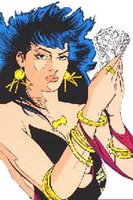
Like the Phantom Stranger, Madame Xanadu has no apparent past. Whereas the Stranger always seems to know what
is happening, Xanadu, a fortune-teller, specializes in knowing what
will happen.
And, like a good female counterpart, Madame Xanadu has a sassy independent streak. There aren't a lot of people who stand up to the Phantom Stranger; she's one of them.
Kid Sidekick: Song the BuddhaboySong is the young Tibetan flautist whom PS saves from falling off a cliff. He's a tough customer, he's devoted to the Stranger, and his brother's the Dali Lama, which might occasionally come in handy.

 Black Sheep: Dr. Terry Thirteen
Black Sheep: Dr. Terry ThirteenIt's actually pretty obvious, when you think about it. The "Black Sheep" isn't
bad per se; he's just the person who swims
against the very grain that the rest of his dynasty swims
with.
No one fits that description better than Dr. 13. He reduces the most supernatural-appearing situations to common phenomena; the Phantom Stranger, on the other hand, lends a mystic importance to even the most mundane of settings.
Besides, Dr. Thirteen has always been associated with the Phantom Stranger. In fact, the Phantom Stranger was originally a supporting figure in Dr. Thirteen's stories, a relationship that reversed itself when the PS got his own series in 1969.
Civilian Companion: Cassandra CraftCassanda Craft is the blind seer who took the Phantom Stranger home when he got his clock cleaned in the Manhattan subways. PS can navigate the mountains of Tibetan and battle demons, but can't manage to avoid get mystically mugged on the Manhattan subway.

 Elder Statesman: Dr. Occult
Elder Statesman: Dr. OccultElder than the Phantom Stranger? What on earth does that mean, when no one knows how old he might be? Well, that might be meaningless
within the comics, from
our perspective lots of characters are older than the Phantom Stranger, since he first appeared in 1952.
Dr. Occult first appeared in 1935. In a sense, he was the Golden Age's "Phantom Stranger": an (apparently) normal man with (comparatively) normal clothes but great (and vague) mystical powers. He's the ideal person to serve as the "Elder Statesman" of the Phantom Dynasty.
 Animal Companion: Detective Chimp.
Animal Companion: Detective Chimp.We already know they're friends;
it was Bobo who saved the Phantom Stranger when the Spectre turned him into a mouse. One function of an Animal Companion is to add a lighter, more "human" touch to a hero's dynasty; Bobo's earthiness would be a helpful counterbalance to PS's famous portentiousness/sententiousness.
Authority Figure: ????First off, let me clarify something for those of you of certain generation:
no, by "????" I do
not mean
Malachi Throne.
What I mean is I'm not quite certain who this should be. In our model, the Civilian Authority Figure is non-superhero who contacts the dynastic centerpiece and asks for help or otherwise helps spur action. Think "Commissioner Gordon". Who on earth (or elsewhere) would serve as the Phantom Stranger's Commissioner Gordon?

At one time, I would have been tempted to put John Constantine in this role. That was his original role in the Swamp Thing saga: directing Swamp Thing (or others) to mystic troublespots without so much engaging in the action himself. But I'm pretty sure that, as a headliner with a title of his own, he's pretty much grown beyond that.
Ah, but there is another character! He's currently unused, doesn't participate in things first hand, and has a history of calling in others to tackle situations. And he lives in Georgetown:
Baron Winter. Like PS he appears normal, but his origins are shrouded in mystery. Unlike PS, who can never stay in one place, Baron Winter
has to stay in one place: he's magically trapped in his own house.
Baron Winter would be a good Commissioner Gordon for PS. That is, if such a thing is ever necessary, given that the Phantom Stranger is famously self-actuating. Part of what makes the Phantom Stranger cool is that he simply shows up in a place where he's needed. It's one of his powers.
Contextualizing City: LOL!That's just not the way the Phantom Stranger rolls. The whole world is his city.




